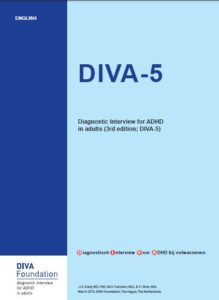
DIVA-5 is the successor to DIVA 2.0, the structured Diagnostic Interview for Adult ADHD, and is based on the criteria for ADHD in DSM-5. DIVA-5 asks about the presence of ADHD symptoms in adulthood as well as childhood, the chronicity of these symptoms, and significant impairments due to these symptoms.
In order to simplify the evaluation of each of the 18 DSM symptom criteria for ADHD in childhood and adulthood, the interview provides a list of concrete and realistic examples, for both current and retrospective (childhood) behavior. The examples are based on the common descriptions provided by adult patients in clinical practice. Examples are also provided of the types of impairments that are commonly associated with the symptoms in five areas of everyday life: work and education; relationships and family life; social contacts; free time and hobbies; self-confidence and self-image.
Because ADHD in adults is a lifelong condition that starts in childhood, it is necessary to evaluate the symptoms, course and level of associated impairment in childhood, using a retrospective interview for childhood behaviors. Whenever possible the information should be gathered from the patient and supplemented by information from informants that knew the person as a child (usually parents or close relatives). The DIVA usually takes around 1 to 1,5 hours to complete.
The DIVA only asks about the core symptoms of ADHD required to make the DSM-5 diagnosis of ADHD, and does not ask about other co-occurring psychiatric symptoms, syndromes or disorders. However comorbidity is commonly seen in both children and adults with ADHD, in around 75% of cases. For this reason, it is important to complete a general psychiatric assessment to enquire about commonly co-occurring symptoms, syndromes and disorders. The most common mental health problems that accompany ADHD include anxiety, depression, bipolar disorder, substance abuse disorders and addiction, sleep problems and personality disorders, and all these should be investigated. This is needed to understand the full range of symptoms experienced by the individual with ADHD; and also for the differential diagnosis, to exclude other major psychiatric disorders as the primary cause of ‘ADHD symptoms’ in adults.
DIVA was published first in Dutch in 2007, and translated into 20 languages, because there was a need for a readily available, structured diagnostic instrument for research and clinical assessment purposes in the field.
DIVA 2.0 has been offered in print in all languages for free at www.divacenter.eu, because DIVA Foundaton aimed to lower the threshold for proper diagnostic assessment of ADHD in adults worldwide. DIVA 2.0 was also available as an app.
DIVA-5 is currently available online in English and Dutch, but unfortunately no longer for free. APA requires a 10-fold increased license fee for use of the DSM criteria in DIVA-5, and this per language, and per printed and app version.
In order to meet our financial obligations to APA, we need to ask a one time fee of 10 Euro for downloading the interview. You will get a code for downloading DIVA-5 ever after. Please help us by spreading this information, and thank you for no longer distributing DIVA by email, but referring to www.divacenter.eu!
The 2 new DIVAs:
- Young DIVA-5 has been developed for children aged 5-17
- DIVA-5-ID: an adapted version for people with Intellectual Disability (DIVA-5-ID)
Hoping DIVA-5 will continue to serve the interests of patients and professionals worldwide,
Sandra Kooij, MD PhD
Chair DIVA Foundation
&
Dora Wynchank, MD PhD
Editor DIVA Foundation
